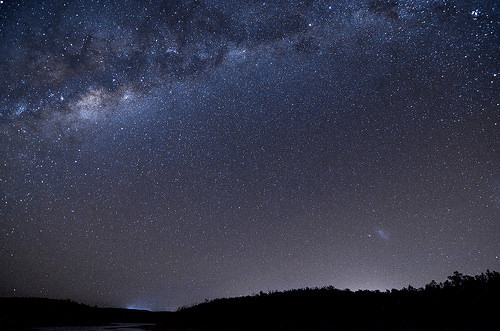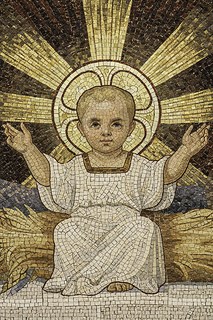I look up at the night sky and I know that, yes, we are part of this universe, we are in this universe, but perhaps more important than both of those facts is that the universe is in us. When I reflect on that fact, I look up -- many people feel small, 'cause they're small and the universe is big, but I feel big, because my atoms came from those stars. (Neil deGrasse Tyson to Time in 2008)
This past Easter season on The Huffington Post, I described my life as having been "forged in the womb of mid-20th century American Evangelicalism," a crucible that produced a parallel universe of Evangelica and a new anti-science. We live with the fruits of that alternate reality today, and Big Oil interests and ultraconservative politicians have learned how to rally a small-but-vocal segment of evangelicals to their cause -- yet another alternative universe where, for example, climate science and evolution are as much a fiction as Santa.
I am hopeful that reminders from evangelicalism's own history will eventually pull the blinders from our eyes, that sound hermeneutics, biblical ethics, a passionate pursuit of God and care for "the least of these" will win the day. An embrace of mystery may yet overwhelm the death grip of certainty. An engagement with science and a renewed willingness to ask the Big Questions will likewise reinvigorate our faith.
Silent Night?
We have forgotten that the very first Christmas is a Jewish story -- and a Roman story. As recorded in the gospels, a young, pregnant girl and her older suitor find themselves in Bethlehem, a small hamlet just outside Jerusalem. This village lay in the shadow of the Herodium, one of a network of fortresses built by Herod that also included the better-known Masada near the Dead Sea. Herod was a master of Roman politics, and the Herodium stood as a visible reminder of Rome's power and its occupation. It seems that the couple, required to take part in a Roman census, might also have come during one of the Jewish festivals, likely Sukkot, "for there was no room for them in the inn," a distinctly post-medieval reading that describes the common understanding still today, 400 years after the King James Bible was first published. Indeed, our understanding of the scene is an anglicized mishmash of the historical events spread out over perhaps two years, a sleepy scene where angels, shepherds, animals and three kings gather around the holy family in a barn, and "little Lord Jesus, no crying he makes."
It was not a silent night.
Childbirth was a dicey proposition throughout human history up to the last century in the modern world. Mother and baby were equally at risk and often died or found themselves permanently damaged. This risk would have been compounded in a scene that included a baby laid in a "manger" -- an animal feeding trough. There were grunts and groans and screams aplenty, and then the piercing cries of a newborn drenched in blood and afterbirth.
Photo credit: Lawrence OP via photopin cc
A Cosmic Story
Yes, that first Christmas was a Jewish story, a Roman story -- and a violent, cosmic story.
In his later years Jesus often railed against "the world," even declaring before Pilate, "My kingdom is not of this world" (John 18:36). Some within evangelicalism seem to have taken this literally, falling prey to the ancient heresy of Gnosticism, with its dualistic understanding of this bad, earthy world contrasted with an ethereal, spiritual realm. This was never the teaching of Jesus or the earliest Christians. As the Apostle Paul said in Ephesians 6:12:
[O]ur struggle is not against flesh and blood but against the rulers, against the authorities, against the powers of this dark world....
It is this world of flesh and blood where babies still die far too young and far too often, this world where the voices of trillions of creatures have fallen silent and thousands upon thousands of species have gone extinct, this world of carbon and billions of years of hurtling stars and the evolution of life with its starts and stops. It is this world, according to the Christian story, that God steps into in a moment, in a manger.
"Emmanuel," meaning "God with us," is the name the prophet Isaiah offers to describe this kind of God (Isaiah 7:14). This was a precursor to the science-fiction convention used over and over again in Doctor Who, Star Trek and every "galaxy far, far away" -- a "rip in the time-space continuum" -- as infinity takes on finitude, as the creator of the stars embraces a body made of stardust. Flesh and blood, this earthy God.
Elizabeth Johnson, Distinguished Professor of Theology at Fordham University, writes that "Jesus Christ is a gift given because 'God so loved the world,' kosmos in Greek (Jn 3:15)." This is the God who lives as the hope of the hopeless, the friend of the oppressed, the one who remembers every last, every lost creature.
Big History requires a massive God. And that is the story of Christmas. That is the essence of the incarnation.

